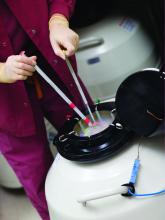Elective frozen embryo transfer for fertility treatment is only associated with an higher live birth rate among individuals with polycystic ovarian syndrome or hyper-responders, or those who underwent preimplantation genetic testing for aneuploidy, research suggests.
Use of frozen embryo transfer also appeared to lower the risk of moderate to severe ovarian hyperstimulation syndrome, although there may be an increased risk of preeclampsia, compared with use of fresh embryos.
A systematic review and meta-analysis, published in Human Reproduction Update, looked at 11 randomized, controlled trials (RCTs) involving 5,379 patients comparing the reproductive, obstetric, and perinatal outcomes of fresh versus frozen embryo transfer for in vitro fertilization (IVF)/intracytoplasmic sperm injection (ICSI).
Matheus Roque, MD, from the ORIGEN–Center for Reproductive Medicine in Rio de Janiero, and his coauthors found that, overall, elective frozen embryo transfer was associated with a 12% higher chance of live birth than fresh (P = .04), although the quality of evidence was low.
When the researchers looked at the effects in different subgroups, they found hyper-responders and individuals with polycystic ovary syndrome had a 16% higher chance of live birth with frozen rather than fresh transfer (P = .004). But among individuals who were normal responders or without polycystic ovary syndrome, there was no significant improvement in live birth rate in the frozen embryo group, compared with the fresh embryo group.
There also was a significant 33% higher live birth rate with frozen embryos, compared with fresh when blastocysts were transferred, although this was deemed very low quality evidence.
In patients who underwent preimplantation genetic testing for aneuploidy, the use of frozen embryos was associated with a 55% higher chance of live birth, compared with the use of fresh embryos (P = .005), but no difference was seen in patients who didn’t have preimplantation genetic testing.
Another subanalysis examined the effects of different routes of progesterone administration and found patients who received intramuscular injections as luteal phase support had a 20% higher chance of live birth with frozen rather than fresh embryos. But no differences were seen for vaginal or oral progesterone.
Researchers also found that the method of embryo cryopreservation, whether slow freezing or vitrification, did not have any impact on live birth rates.
However, patients who underwent frozen embryo transfer showed a 58% lower risk of moderate to severe ovarian hyperstimulation syndrome, compared with those who had fresh embryo transfer. At the same time, the risk of preeclampsia was 79% higher with frozen, compared with fresh transfer.
“There are currently no clinical data supporting the indiscriminate use of eFET [elective frozen embryo transfer] for all patients submitted to IVF/ICSI,” Dr. Roque and his coauthors wrote. “Based on the available RCTs, it seems appropriate to implement this strategy in patients at risk of OHSS [ovarian hyperstimulation syndrome], in hyper-responders, and in those undergoing PGT-A [preimplantation genetic testing for aneuploidy] at the blastocyst stage.”
No funding or conflicts of interest were reported.
SOURCE: Roque M et al. Hum Reprod Update. 2018 Nov 2. doi: 10.1093/humupd/dmy033.


